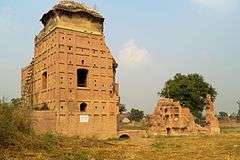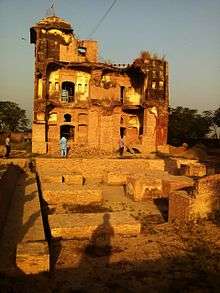Jahaz Haveli
| Jahaz Haveli | |
|---|---|
 Jahaz Haveli (Haveli Todar Mal) | |
| Former names | Jahaz Mahal |
| Alternative names | Haveli Todar Mal |
| General information | |
| Type | Haveli |
| Architectural style | Mughal |
| Location | Fatehgarh Sahib, Punjab |
| Address | Harnam Nagar |
| Completed | 17th century |
| Owner | SGPC |
The Haveli Todar Mal popularly known as Jahaz Haveli or Jahaz Mahal is the 17th-century residence (haveli) of Todar Mal, a local businessman from Sirhind, and an ardent follower of the Sikh Gurus, who became the diwan in the court of Nawab Wazir Khan, the Governor of Sirhind, under Mughal Empire. Today, he is most remembered for defying the Mughals by arranging for the cremation of young martyred sons of Guru Gobind Singh and his mother.[1]
The haveli is situated in Harnam Nagar, on the Eastern side of Sirhind-Rupnagar Railway Line just 1 km away from Fatehgarh Sahib, and is now being taken over and restored by SGPC with the help of Punjab govt and INTACH.[1][2][3][4] Todar Mal descendants moved from Sirhind to Ludhaina. The present descendants known as Mandals are from sub caste of Sood and are Kshatriyas. Both Todar Mal's in history are from the same family. The mandal family records are available in Haridwar since 16 th century. Todar Mal was from Punjab.
Architecture

The lavish haveli constructed with Sirhindi bricks stand just outside the Mughal Governor Nawab Wazir Khan’s palace, once boasts of a grand reception area to receive and entertain guests and a well laid-out ground complete with a pool and fountains.[5]
Diwan Todar Mal
Diwan Todar Mal was an Agarwal businessman,[6] and as per account in the Phulkian state gazetteer, he belonged to Kakra village, a few miles from Patiala.[7]
In Sikh history, he is remembered for buying a small piece of land for the cremation of the dead bodies of Mata Gujri, the mother and Sahibzada Zorawar Singh and Baba Fateh Singh, the two younger sons of 10th Sikh Guru, Guru Gobind Singh in 1704 A.D, by paying an exorbitant price to the owner of the land. He had to cover the whole piece of land with gold coins (ashrafis) in a vertical position, as he was asked to vertically place gold coins on the land and only that much land was given to him which he could cover with gold coins. He later also made arrangements for their cremation. But, according to Dr Harjinder Singh Dilgeer, the bodies of all the three were cremated by the descendants of Todar Mall Shahjahani because the latter had already died in 1665-66.[8]
Todar Mal, however had to bear the brunt Wazir Khan wrath, and he and his family had to abandon the haveli soon after, and themselves faded into oblivion, with dilapidated building being their only reminde. In the coming years, the haveli fell into rapid disrepair, and collapsed at many place. Though it survived ransacking of Sirhind by Banda Bahadur and during the reign of The Sikh Confederacy, the haveli was left untouched out of respect for Diwan Todar Mal.[5][9]
Today, Gurdwara Jyoti Swarup, now stands at the place where these three martyrs were cremated and the road connecting the two Gurdwaras is known as Dewan Todar Mal Marg. Even today Diwan Todar Mal is deeply respected by the Sikhs and a Diwan Todar Mal Memorial Hall, congregation hall has been constructed at historic Gurudwara Fatehgarh Sahib by SGPC.[10][11]
See also
Gallery
 Brief description of history of Haveli Todar Mal ,Fatehgarh Sahib district,Punjab,India
Brief description of history of Haveli Todar Mal ,Fatehgarh Sahib district,Punjab,India Haveli Todar Mal,Fatehgarh Sahib district,Punjab,India
Haveli Todar Mal,Fatehgarh Sahib district,Punjab,India Ruins of Haveli Todar Mal,Fatehgarh Sahib district,Punjab,India
Ruins of Haveli Todar Mal,Fatehgarh Sahib district,Punjab,India Well at Haveli Todar Mal,Fatehgarh Sahib district,Punjab,India
Well at Haveli Todar Mal,Fatehgarh Sahib district,Punjab,India
References
- 1 2 "Aggarwal Sabha hails SGPC move". The Tribune. December 31, 2009.
- ↑ "Shrines: Haveli Todar Mal". Fatehgarh Sahib district website.
- ↑ "Jahaz Haveli to get a facelift by Gurdeep Singh Mann". The Tribune. January 4, 2010.
- ↑ "SGPC keen on Sikh heritage conservation". The Indian Express. May 31, 2008.
- 1 2 "The forgotten Diwan of Sirhind". The Tribune. January 2, 2004.
- ↑ http://www.tribuneindia.com/2008/20080929/bathinda.htm
- ↑ Sarbjit Dhaliwal (May 5, 2008). "There were 2 Todar Mals: Historian". The Tribune.
- ↑ Dr Harjinder Singh Dilgeer, SIKH HISTORY IN 10 VOLUMES, vol 1, p. 375.
- ↑ Fatehgarh Sahib /Sirhind Govt of Punjab, Revenue Dept.
- ↑ "Dewan Todar Mal- A true devotee of the Guru". Fatehgarh Sahib website.
- ↑ Khushwant Singh (2009-11-07). "An Ancient Brotherhood". The Telegraph.